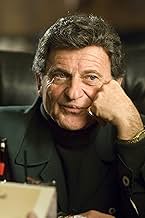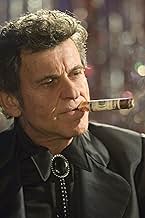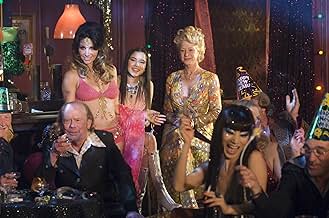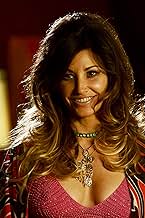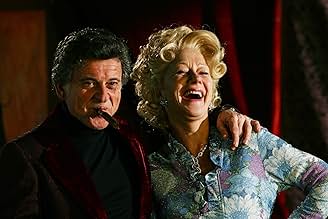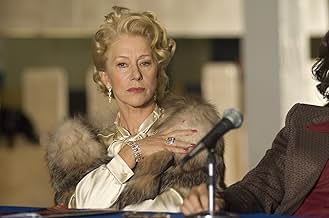CALIFICACIÓN DE IMDb
5.6/10
3.5 k
TU CALIFICACIÓN
Un drama centrado en una pareja casada que abrió el primer burdel legal en Nevada.Un drama centrado en una pareja casada que abrió el primer burdel legal en Nevada.Un drama centrado en una pareja casada que abrió el primer burdel legal en Nevada.
- Premios
- 1 premio ganado y 1 nominación en total
Raoul Max Trujillo
- Hernan Prado
- (as Raoul Trujillo)
- Dirección
- Guionista
- Todo el elenco y el equipo
- Producción, taquilla y más en IMDbPro
Opiniones destacadas
The film has two sags: One very early on in Act I and another late in Act II. In observing a small private audience that was viewing this film, they were all very much engaged in the drama and the action throughout, but they were nearly lost during the two sags. If it were not for those, the film might have attracted a larger audience.
This is not the story of the Mustang Ranch, per se, but rather the story an ambiguous love triangle. (I am thoroughly aware of the Mustang Ranch story, and know Joe Conforte's attorney and best friend, Virgil Bucchanieri, quite well). For example, the film does not use the gimmick of trying to exaggerate the characters that inhabit the brothel, and resists the temptation of trying to replicate the exotica of the Star Wars bar scene.
The real test for a film with this class of story arc is the degree to which we care about the characters mid-way through Act II. Do we care what happens to them in Act III? I and the other audience members all agreed that we did and we shed the expected tears in a tense moment between the dreamer, played by Joe Pesci, and the determined pragmatist, played by Helen Mirren, in the penultimate scene. None of the central or supporting roles were in any way "cardboard" characters.
The production values were quite high and the number of technical errors were minimal (three errors with production sound that really should have been fixed in post plus a couple of continuity errors). Music was very subtle to the point of vanishing at times. There was no attempt at creating a photographic theme: it was all shot color-balanced at neutral without any exaggerated focus-pulls, odd camera framing or moves (but a lot of crane rentals were involved), Pro-mist filters, or too many magic hour shots. That is, the cinematography did not draw attention away from the drama.
The film resolves unambiguously with a shock ending that is well worth waiting for. My final test of entertainment value is: "Are there any scenes in this film that I will remember and repeat in my mind's eye the next day?" I would say that there are such scenes, and I therefore give this picture a 7 out of 10.
This is not the story of the Mustang Ranch, per se, but rather the story an ambiguous love triangle. (I am thoroughly aware of the Mustang Ranch story, and know Joe Conforte's attorney and best friend, Virgil Bucchanieri, quite well). For example, the film does not use the gimmick of trying to exaggerate the characters that inhabit the brothel, and resists the temptation of trying to replicate the exotica of the Star Wars bar scene.
The real test for a film with this class of story arc is the degree to which we care about the characters mid-way through Act II. Do we care what happens to them in Act III? I and the other audience members all agreed that we did and we shed the expected tears in a tense moment between the dreamer, played by Joe Pesci, and the determined pragmatist, played by Helen Mirren, in the penultimate scene. None of the central or supporting roles were in any way "cardboard" characters.
The production values were quite high and the number of technical errors were minimal (three errors with production sound that really should have been fixed in post plus a couple of continuity errors). Music was very subtle to the point of vanishing at times. There was no attempt at creating a photographic theme: it was all shot color-balanced at neutral without any exaggerated focus-pulls, odd camera framing or moves (but a lot of crane rentals were involved), Pro-mist filters, or too many magic hour shots. That is, the cinematography did not draw attention away from the drama.
The film resolves unambiguously with a shock ending that is well worth waiting for. My final test of entertainment value is: "Are there any scenes in this film that I will remember and repeat in my mind's eye the next day?" I would say that there are such scenes, and I therefore give this picture a 7 out of 10.
The thing that stands out immediately in "Love Ranch" is not the girls, not the 1970s clothes, but the amazing photography. Almost every outdoor scene could be the vista for a postcard. The story itself seems to drag in places, and then suddenly rush to a conclusion, with narration to tidy up the ending. The acting by Helen Mirren and Joe Pesci is terrific as expected, and a small scene with Harve Presnell a pleasant surprise. What is not a surprise is the tale of the Mustang Ranch on which the movie is based. It's tough to overcome the familiarity of a story often aired on cable over the last two decades. - MERK
8mckn
Picture a caricature of everything that America, at some level, holds dear, yet despises. Think bling, brash, frantically optimistic and determinedly selfish, and you have the main character typecast by a weathered Joe Pesci. Add to the mix an insecure, yet intelligent and reasonably efficient brothel "madam" who is trapped by economics and an irresponsible, hyperactive, and deliberately delusional husband, and. you have a marriage which must resonate across the globe.
The film opens with an ironic and trite hope for the future. Auld Lang Syne is sung at a New Year's Eve party, which Robert Burnes, no stranger to joys of the flesh himself, would possibly have avoided. A stark naked man who has transcended the bounds of good taste, and possibly the law, is driven by the "Madam" (Helen Mirren) into the waiting furniture wielded by her husband, Pesci. The tame police in attendance remove the problem and the party continues.
Gradually the dynamics of the Pesci/Mirren relationship are revealed. She actually likes her charges and comforts herself in the knowledge that she is keeping them off the streets.
He struts around like a dove with an over-inflated breast, a disgustingly showy car with the vanity plate "LUV SEX", and the nickname of "Mr Good Times". He is a man whose very posture suggests violence, and he has only to threaten to smash the home telephone, her link to the outside world, to ensure that her timid attempt at rebellion turns into a whimpering desire to please him.
Pleasing him in the only way he understands is not that easy as she is older than the available nymphets and is very aware that his sudden business calls are not to any office block. The marriage of financial and social convenience could, theoretically, have lasted for years, as many convenient couples will attest, but reality has the unpleasant habit of intruding. A visit to the doctor and plastic convenience is stripped away. The selfishness of her husband is expertly conveyed in his answer to her questioning his love for her. "I *** love you," he says, "I could have never found a woman as loyal as you to take my s***." It says everything that he is totally unaware of the egocentric nature of his declaration of love.
Later, when their world is falling apart, and she is experiencing loss, and almost claustrophobic grief,he rails at her that she doesn't know what the **** he went through all night.
The tragic moment which announces the end of the film is justified by the quality of the acting. Yes, this could happen, and be a small article on the front page of the morning newspapers, but the film has made its point before the actual violence. It is all about self, the need for self-validation at the expense of others, the need to be desirable, the need to be in control, and even the need to be physically dominant while all these have inevitably and irrevocably been taken away by time.
It is a film worthy of a second viewing, if only to enjoy the performance of Pesci (which he has reprized from Goodfellas) and the revelation which is Helen Mirren. That she could go from the ultra- British role as the Queen to this, without a trace of genteel accent, but retain all the pathos of a woman who wants to love her husband and her life, is remarkable. Even the director gives her credit in an in- joke. When her husband dons a hat in keeping with his personality, she asks him who he thinks he is, 'Clint Eastwood'. He replies: "Who do you think you are? The Queen of England?"
Eminently watchable, character-driven, and filmed with an understated slickness, this is a film which might, regrettably, not set the box office alight, but which is very worth viewing for so many reasons. True, there are elements that echo events in some well-known films, which my spoiler-conscience prevents me from naming, but it is safe to say that this film strips the sentimentality from such and is the better for it. Taylor Hackford, I look forward to your next.
The film opens with an ironic and trite hope for the future. Auld Lang Syne is sung at a New Year's Eve party, which Robert Burnes, no stranger to joys of the flesh himself, would possibly have avoided. A stark naked man who has transcended the bounds of good taste, and possibly the law, is driven by the "Madam" (Helen Mirren) into the waiting furniture wielded by her husband, Pesci. The tame police in attendance remove the problem and the party continues.
Gradually the dynamics of the Pesci/Mirren relationship are revealed. She actually likes her charges and comforts herself in the knowledge that she is keeping them off the streets.
He struts around like a dove with an over-inflated breast, a disgustingly showy car with the vanity plate "LUV SEX", and the nickname of "Mr Good Times". He is a man whose very posture suggests violence, and he has only to threaten to smash the home telephone, her link to the outside world, to ensure that her timid attempt at rebellion turns into a whimpering desire to please him.
Pleasing him in the only way he understands is not that easy as she is older than the available nymphets and is very aware that his sudden business calls are not to any office block. The marriage of financial and social convenience could, theoretically, have lasted for years, as many convenient couples will attest, but reality has the unpleasant habit of intruding. A visit to the doctor and plastic convenience is stripped away. The selfishness of her husband is expertly conveyed in his answer to her questioning his love for her. "I *** love you," he says, "I could have never found a woman as loyal as you to take my s***." It says everything that he is totally unaware of the egocentric nature of his declaration of love.
Later, when their world is falling apart, and she is experiencing loss, and almost claustrophobic grief,he rails at her that she doesn't know what the **** he went through all night.
The tragic moment which announces the end of the film is justified by the quality of the acting. Yes, this could happen, and be a small article on the front page of the morning newspapers, but the film has made its point before the actual violence. It is all about self, the need for self-validation at the expense of others, the need to be desirable, the need to be in control, and even the need to be physically dominant while all these have inevitably and irrevocably been taken away by time.
It is a film worthy of a second viewing, if only to enjoy the performance of Pesci (which he has reprized from Goodfellas) and the revelation which is Helen Mirren. That she could go from the ultra- British role as the Queen to this, without a trace of genteel accent, but retain all the pathos of a woman who wants to love her husband and her life, is remarkable. Even the director gives her credit in an in- joke. When her husband dons a hat in keeping with his personality, she asks him who he thinks he is, 'Clint Eastwood'. He replies: "Who do you think you are? The Queen of England?"
Eminently watchable, character-driven, and filmed with an understated slickness, this is a film which might, regrettably, not set the box office alight, but which is very worth viewing for so many reasons. True, there are elements that echo events in some well-known films, which my spoiler-conscience prevents me from naming, but it is safe to say that this film strips the sentimentality from such and is the better for it. Taylor Hackford, I look forward to your next.
I sought this movie out on DVD because it's cinema release was negligible, and anything with Helen Mirren will have some merit. I can only imagine it's almost invisible release was due to the inability of the youthful marketeers to easily identify the box in which to place it, romance, thriller, gangster flic? For those of us who don't care about such trite labels, this is an interesting movie, characters with some depth, it's not really about goodies or baddies, or even right or wrong, it's a story, with some romance, some humour, some sex, some drama, great performances from stalwarts and what should have been a launch pad to international stardom for the young Spaniard...fear not Sergio, we will see you again. I liked it a lot and really recommend it to people who enjoy films about other people rather than machines and/or concepts!
It's 1976. Married couple Grace (Helen Mirren) and Charlie Bontempo (Joe Pesci) own the Love Ranch outside of Reno. Irene (Gina Gershon), Mallory (Taryn Manning), Christina (Scout Taylor-Compton), Samantha (Bai Ling), and Alana (Elise Neal) are some of the girls working at the ranch. Charlie is unstable and recruits boxer Armando Bruza to train out on the ranch. His criminal background forces Grace to be Bruza's manager. He controls the local police and faces an effort to criminalize prostitution.
This is a mess of stories. It can't be the actors because there are some great ones here. There is probably too many story elements going on. It's in the writing itself. It should concentrate on Mirren and Pesci. It should also get somebody bigger than Sergio Peris-Mencheta. The movie seems to struggle for an identity. It's a waste of great talents.
This is a mess of stories. It can't be the actors because there are some great ones here. There is probably too many story elements going on. It's in the writing itself. It should concentrate on Mirren and Pesci. It should also get somebody bigger than Sergio Peris-Mencheta. The movie seems to struggle for an identity. It's a waste of great talents.
¿Sabías que…?
- TriviaBased at least roughly on 1976 events involving the Mustang Ranch in Sparks, Nevada, and Argentine former heavyweight Oscar "Ringo" Bonavena.
- ErroresAt the beginning of the film, Charlie and the band are performing to a packed house. The drummer uses a crash cymbal from the very popular Zildjian company, the A Custom. This movie takes place in 1976, and the Zildjian A Custom didn't come out until 1990.
- Citas
[first lines]
Grace Bontempo: Selling love will make you rich. That's what my mother taught me. Just don't put your heart in it.
- Bandas sonorasI Just Want to Make Love to You
Written by Willie Dixon
Performed by Foghat
Courtesy of Bearsville Records/Rhino Entertainment Company
By arrangement with Warner Music Group Film & TV Licensing and by arrangement with Victor Entertainment, Inc. for Japan
Selecciones populares
Inicia sesión para calificar y agrega a la lista de videos para obtener recomendaciones personalizadas
Detalles
- Fecha de lanzamiento
- Países de origen
- Sitio oficial
- Idioma
- También se conoce como
- Ljubezenski ranc
- Locaciones de filmación
- Productoras
- Ver más créditos de la compañía en IMDbPro
Taquilla
- Presupuesto
- USD 25,000,000 (estimado)
- Total en EE. UU. y Canadá
- USD 137,885
- Fin de semana de estreno en EE. UU. y Canadá
- USD 44,220
- 4 jul 2010
- Total a nivel mundial
- USD 146,149
- Tiempo de ejecución
- 1h 57min(117 min)
- Color
- Mezcla de sonido
- Relación de aspecto
- 1.85 : 1
Contribuir a esta página
Sugiere una edición o agrega el contenido que falta


